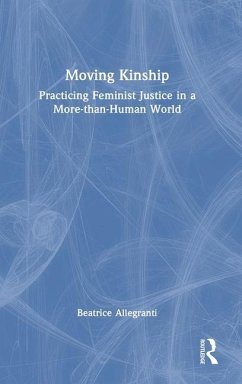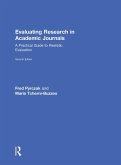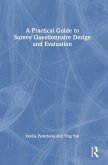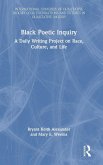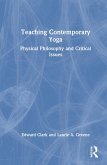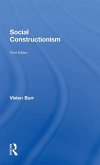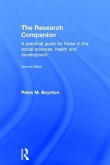Moving Kinship offers a rich resource for feminist activists and scholars, trauma-informed therapists, somatic, movement and dance practitioners, artists, and those interested in ethical and politically just ways to materially engage with grief, loss, dispossession and trauma.
Hinweis: Dieser Artikel kann nur an eine deutsche Lieferadresse ausgeliefert werden.
Hinweis: Dieser Artikel kann nur an eine deutsche Lieferadresse ausgeliefert werden.
What does it mean to be moved? How do we work with experience to improve our sense of belonging in the world and to forge meaning in times of dizzying change and disruption? Where is it possible to enact political imperatives or to surface voices and memories that are overlooked, under-represented, or that simply go unheard? In this ground-breaking work, Beatrice Allegranti invites us to grapple with these questions and many more besides. Conjuring the idea of 'moving with the trouble,' Allegranti sets out a new terrain of enquiry that spans themes of embodiment, memory, trauma, grief, loss, performance, and the intersectional sensorium of both human and more-than-human experience. Coining the term 'kin-aesthesia,' she offers a richly choreographed journey through research, philosophy, psychoanalysis, dance, and artwork, bringing the reader into contact with ideas, feelings, and a sense of urgency that connects artistic practice to making sense and to new ways of being. A deeply feminist project, Moving Kinship speaks to the defining questions of our post-Covid, "post-truth" times. It entangles the reader with its explorations, helping silences to become resonant, and darkness to be illuminated and illuminating in equal measure. It's a dazzling read, charged with the power of curiosity and openness. It brings the reader into the kinship project at its very heart, leaving its own rich traces and tangible invitations into becoming imbricated in its politics.
Caro Bainbridge, Coach, Consultant, Emerita Professor of Culture and Psychoanalysis.
This book is beautiful, haunting, and poetic. Allegranti moves between compelling personal storying, complex theoretical concepts, and powerful accounts of both therapeutic and artistic practice, all the while challenging the reader to pay attention to the politics that thread through and between each of these. Moving Kinship is both a gift and a call to action. We are all in her debt.
Jonathan Wyatt, Professor of Qualitative Inquiry and co-director Centre for Creative-Relational Inquiry, The University of Edinburgh.
This book is crafted as an art piece that advocates for social justice and viscerally challenges traditional ways of creating knowledge. Beatrice Allegranti puts at the centre of its exploration the body, its movements, its sentiments and affects. Accompanied by bespoke illustrations and poetry, the text denounces power structures and oppression, inviting the reader to reckon with an ethical relating. Allegranti's autoethnographic and philosophical work explores the consequences of loss and trauma suggesting 'moving with the trouble' of our feelings and senses as an antidote. Moving Kinship resembles a colourful kaleidoscope where, through the prism of feminism, choreography and psychotherapy, the reader constantly discovers critical intersectional insights.
Dr. Alejandra Benitez, Social Activist and Gender Expert, Mexico.
Beatrice Allegranti expertly weaves profound stories of love and loss through multiple and diverse temporalities as well as geo-emotional space/s. A self-identified artist-psychotherapist-scholar, Allegranti guides us through her Moving Kinship project which goes beyond trauma-informed choreography and into considerations of family, kinship, collectivity. Using a critical autoethnographic voice to explore the intersections (and intersectionality) of race, gender, more-than-human kinship and creative relationality, Allegranti draws on feminist new materialist theorists and philosophers as well as autoethnographers as her fellow-travellers. Mourning her father's sudden death during her Moving Kinship project, the author writes us into the ways in which posthuman autoethnography becomes-with the events, the nowness, the inevitable ruptures of lives intent on the 'best laid plans.' She writes with a choreographer's attention to all types of movement, and the reliability of somatic knowing. A beautiful text that truly challenges the 'thingness' of words on pages and reminds us that they, too, have lives worth sharing.
Professor Daniel X. Harris, ARC Future Fellow, Co-Director, Creative Agency Research Lab, RMIT University.
Moving Kinship is truly an embodied text. Through her work in dance, art and movement Allegranti allows us to see how and why we are inexorably part of the body politic in human and more than human intra-actions. With stark sociocultural accountability, Allegranti articulates our yearning for kinship, the longing of connectedness to people and vibrant matter that we all share. This is a text for all of us interested in the coalescence of movement, therapy, feminism, and materialism. Moving Kinship will summon you to dance the collisions and communions of being with others. Accept the invitation.
Tami Spry, Professor Emeritus of Communication and Performance Studies, St. Cloud State University.
I encountered Moving Kinship as a fellow professora of capoeira and social justice advocate - rather than an academic or psychotherapist - and found reading it a profoundly moving and enriching experience. Its autoethnography enabled me to posit myself in the concept of 'kin-aesthesia,' and consider the interrelations between my own personal traumas, identity, intersectional inequality, and my movement and music practice through capoeira. Allegranti has written a hugely impressive and personally affecting body of work.
Ebony Riddell Bamber, Global Programme Leader - Human Rights, Gender & Reparative Justice.
Moving Kinship is a profound journey into the soul of movement, providing a new space for human connection. Beatrice Allegranti dances through the lives of diverse communities, from those battling with early onset dementia to LGBTQ+ artists, revealing deep-rooted layers of repression and stigma hidden in our everyday interactions. Her work offers a place to heal anchored in movement, socioeconomic realities, and the power of embracing our own experiences. Beautifully written and illustrated, every word is honest and powerful as it is woven from personal material. Immersing yourself in its pages, you'll undoubtedly resonate with the raw emotions of a world longing for transformation and feel the passionate call to arms inspiring activists, artists, and therapists to embrace movement and kinship as instruments of profound multi-layered change that starts in the individual but powers itself collectively.
Beatriz Calvo-Merino, Professor in Cognitive Neuroscience, City University.
Moving Kinship is a book to slow dance with. Carve out some space and time to be moved by what else trauma-responsive embodied practice can become when it is understood as a transdisciplinary, transgenerational and transformational affair. Marbled throughout with an intra-sectional feminist, queer and decolonial praxis, each chapter offers up a 'kin-aesthetic' time-bending, site-stretching wander-land to un/settle into. From the commissioned illustrations that open each chapter, to the polyvocal poems woven throughout, we are (en)treated to explore what it feels like to choreograph the political and move with the trouble as the making and mattering of the kinship project unfolds. Allegranti's metamorphosing project enables artists to attune to, co-create and response-ably gift public and private movement performances - in the streets, in museums, in homes, in dusty ruins. From thinking-with woodfrogs and icebergs, to moving with the more-than of dementia, to the radical decolonising refrains of Capoeira, this care-fully crafted text brings all the pheeels (post-human affects) and will inspire a generation of movers and shakers who want to enact more-than-human rights, equity and justice.
EJ Renold, Professor of Childhood Studies, University of Cardiff.
Caro Bainbridge, Coach, Consultant, Emerita Professor of Culture and Psychoanalysis.
This book is beautiful, haunting, and poetic. Allegranti moves between compelling personal storying, complex theoretical concepts, and powerful accounts of both therapeutic and artistic practice, all the while challenging the reader to pay attention to the politics that thread through and between each of these. Moving Kinship is both a gift and a call to action. We are all in her debt.
Jonathan Wyatt, Professor of Qualitative Inquiry and co-director Centre for Creative-Relational Inquiry, The University of Edinburgh.
This book is crafted as an art piece that advocates for social justice and viscerally challenges traditional ways of creating knowledge. Beatrice Allegranti puts at the centre of its exploration the body, its movements, its sentiments and affects. Accompanied by bespoke illustrations and poetry, the text denounces power structures and oppression, inviting the reader to reckon with an ethical relating. Allegranti's autoethnographic and philosophical work explores the consequences of loss and trauma suggesting 'moving with the trouble' of our feelings and senses as an antidote. Moving Kinship resembles a colourful kaleidoscope where, through the prism of feminism, choreography and psychotherapy, the reader constantly discovers critical intersectional insights.
Dr. Alejandra Benitez, Social Activist and Gender Expert, Mexico.
Beatrice Allegranti expertly weaves profound stories of love and loss through multiple and diverse temporalities as well as geo-emotional space/s. A self-identified artist-psychotherapist-scholar, Allegranti guides us through her Moving Kinship project which goes beyond trauma-informed choreography and into considerations of family, kinship, collectivity. Using a critical autoethnographic voice to explore the intersections (and intersectionality) of race, gender, more-than-human kinship and creative relationality, Allegranti draws on feminist new materialist theorists and philosophers as well as autoethnographers as her fellow-travellers. Mourning her father's sudden death during her Moving Kinship project, the author writes us into the ways in which posthuman autoethnography becomes-with the events, the nowness, the inevitable ruptures of lives intent on the 'best laid plans.' She writes with a choreographer's attention to all types of movement, and the reliability of somatic knowing. A beautiful text that truly challenges the 'thingness' of words on pages and reminds us that they, too, have lives worth sharing.
Professor Daniel X. Harris, ARC Future Fellow, Co-Director, Creative Agency Research Lab, RMIT University.
Moving Kinship is truly an embodied text. Through her work in dance, art and movement Allegranti allows us to see how and why we are inexorably part of the body politic in human and more than human intra-actions. With stark sociocultural accountability, Allegranti articulates our yearning for kinship, the longing of connectedness to people and vibrant matter that we all share. This is a text for all of us interested in the coalescence of movement, therapy, feminism, and materialism. Moving Kinship will summon you to dance the collisions and communions of being with others. Accept the invitation.
Tami Spry, Professor Emeritus of Communication and Performance Studies, St. Cloud State University.
I encountered Moving Kinship as a fellow professora of capoeira and social justice advocate - rather than an academic or psychotherapist - and found reading it a profoundly moving and enriching experience. Its autoethnography enabled me to posit myself in the concept of 'kin-aesthesia,' and consider the interrelations between my own personal traumas, identity, intersectional inequality, and my movement and music practice through capoeira. Allegranti has written a hugely impressive and personally affecting body of work.
Ebony Riddell Bamber, Global Programme Leader - Human Rights, Gender & Reparative Justice.
Moving Kinship is a profound journey into the soul of movement, providing a new space for human connection. Beatrice Allegranti dances through the lives of diverse communities, from those battling with early onset dementia to LGBTQ+ artists, revealing deep-rooted layers of repression and stigma hidden in our everyday interactions. Her work offers a place to heal anchored in movement, socioeconomic realities, and the power of embracing our own experiences. Beautifully written and illustrated, every word is honest and powerful as it is woven from personal material. Immersing yourself in its pages, you'll undoubtedly resonate with the raw emotions of a world longing for transformation and feel the passionate call to arms inspiring activists, artists, and therapists to embrace movement and kinship as instruments of profound multi-layered change that starts in the individual but powers itself collectively.
Beatriz Calvo-Merino, Professor in Cognitive Neuroscience, City University.
Moving Kinship is a book to slow dance with. Carve out some space and time to be moved by what else trauma-responsive embodied practice can become when it is understood as a transdisciplinary, transgenerational and transformational affair. Marbled throughout with an intra-sectional feminist, queer and decolonial praxis, each chapter offers up a 'kin-aesthetic' time-bending, site-stretching wander-land to un/settle into. From the commissioned illustrations that open each chapter, to the polyvocal poems woven throughout, we are (en)treated to explore what it feels like to choreograph the political and move with the trouble as the making and mattering of the kinship project unfolds. Allegranti's metamorphosing project enables artists to attune to, co-create and response-ably gift public and private movement performances - in the streets, in museums, in homes, in dusty ruins. From thinking-with woodfrogs and icebergs, to moving with the more-than of dementia, to the radical decolonising refrains of Capoeira, this care-fully crafted text brings all the pheeels (post-human affects) and will inspire a generation of movers and shakers who want to enact more-than-human rights, equity and justice.
EJ Renold, Professor of Childhood Studies, University of Cardiff.

